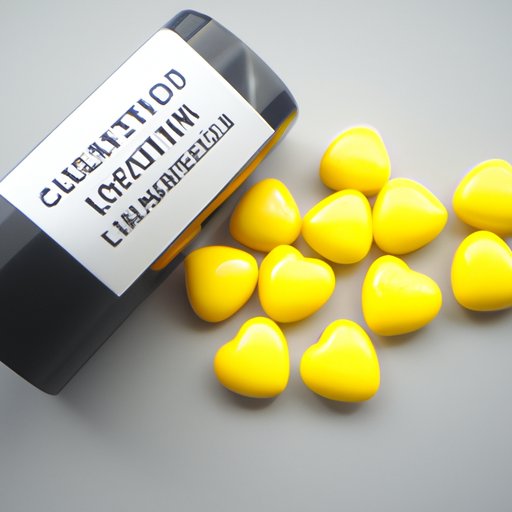Introduction
Cholesterol is an essential substance present in all human cells. It helps to form cell membranes, hormones, and other substances that are important for the body’s normal functioning. However, too much cholesterol can be harmful and can increase the risk of heart disease and stroke. This is because it can build up in the arteries and cause blockages, making it difficult for blood to flow freely.
Crestor is a prescription medication used to lower cholesterol levels in the body. It belongs to a class of drugs called statins, which work by blocking an enzyme in the liver that produces cholesterol. Crestor is also used to reduce the risk of heart attack, stroke, and other cardiovascular events in people who are at high risk.
Explaining the Role of Crestor in Lowering Cholesterol
Crestor is primarily used to lower levels of low-density lipoprotein (LDL) cholesterol, which is known as the “bad” cholesterol. High levels of LDL cholesterol can lead to a buildup of plaque in the walls of the arteries, increasing the risk of heart attack and stroke. By lowering LDL cholesterol, Crestor can help reduce this risk.
In addition to lowering LDL cholesterol, Crestor also helps to raise levels of high-density lipoprotein (HDL) cholesterol, which is known as the “good” cholesterol. High levels of HDL cholesterol can help protect against heart disease and stroke. Thus, taking Crestor can help to reduce the overall risk of cardiovascular disease.
Examining Crestor’s Mechanism of Action
Crestor works by blocking an enzyme in the liver called HMG-CoA reductase. This enzyme is responsible for producing cholesterol, so by blocking it, Crestor reduces the amount of cholesterol produced. This helps to lower levels of LDL cholesterol and raise levels of HDL cholesterol in the blood.
Crestor is available in several different strengths, including 5 mg, 10 mg, 20 mg, and 40 mg tablets. The dose prescribed will depend on the patient’s individual needs, as well as their medical history and other medications they may be taking.

Investigating the Side Effects of Crestor
Like all medications, Crestor can cause side effects. Common side effects include headache, nausea, abdominal pain, and constipation. These side effects are usually mild and do not require medical attention. However, if they persist or become severe, it is important to contact your doctor.
Crestor can also cause more serious side effects, such as liver damage, muscle pain, and increased risk of diabetes. These side effects are rare but should be taken seriously. If you experience any of these symptoms, contact your doctor right away.
Comparing Crestor to Other Cholesterol-Lowering Drugs
Crestor is part of a class of drugs called statins, which are used to lower cholesterol levels. Other statin drugs include Lipitor, Zocor, and Pravachol. Compared to other statins, Crestor has been shown to be more effective at lowering LDL cholesterol and raising HDL cholesterol. However, it is important to discuss your options with your doctor before deciding which drug is best for you.
In addition to statins, there are other types of cholesterol-lowering drugs, such as bile acid sequestrants and fibrates. These drugs work differently than statins and may be prescribed if statins are not effective or if the patient cannot tolerate them. Again, it is important to speak to your doctor before taking any medication.

Analyzing the Dosing Regimen for Crestor
The recommended dosage for Crestor varies depending on the patient’s medical history, current medications, and other factors. Generally, the starting dose is 10 mg once daily, although some patients may need a higher or lower dose. It is important to follow your doctor’s instructions when taking Crestor.
It is also important to remember that the dosage of Crestor may need to be adjusted over time. This is especially true for patients with kidney or liver disease, as the drug can accumulate in the body and cause side effects. Your doctor may also adjust the dosage if you are taking other medications that interact with Crestor.
Conclusion
Crestor is an effective medication for lowering cholesterol levels and reducing the risk of heart attack, stroke, and other cardiovascular events. It works by blocking an enzyme in the liver that produces cholesterol, thereby reducing the amount of LDL cholesterol in the blood. In addition, Crestor can help to raise HDL cholesterol levels, providing further protection against heart disease.
While Crestor is generally safe and effective, it is important to understand the potential side effects and to follow the dosing instructions provided by your doctor. It is also important to speak to your doctor about any other medications you are taking, as some drugs may interact with Crestor and affect its effectiveness.
(Note: Is this article not meeting your expectations? Do you have knowledge or insights to share? Unlock new opportunities and expand your reach by joining our authors team. Click Registration to join us and share your expertise with our readers.)
